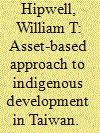|
|
|
Sort Order |
|
|
|
Items / Page
|
|
|
|
|
|
|
| Srl | Item |
| 1 |
ID:
092970


|
|
|
|
|
| Publication |
2009.
|
| Summary/Abstract |
Numerous scholars studying community efforts to (re-)establish autonomy have begun to focus on the importance of empowerment in the economic, political and cultural spheres. There is a growing understanding that such empowerment can be hastened by affirmative development strategies that build on community assets and capacities rather than attempting to redress - and thereby emphasising - needs or lack. Such development work reflects intertwined currents in contemporary philosophy, influenced by the thought of Friedrich Nietzsche and of Gilles Deleuze. In Taiwan, a recent resurgence in identities among marginalised aboriginal or indigenous peoples ('Formosans') has been accompanied by novel approaches to development. This discussion heuristically employs a set of development theories that are essentially variants of 'asset-based community development' (ABCD) to suggest that a focus on affirmation and empowerment has been and can be a key to success in Formosan development initiatives. The paper presents the results of qualitative field research, illuminating three case studies of Formosan development - in Tsou, Tayal and Taroko territories. It argues that Formosan development will benefit from a focus on community capacity, political empowerment and social as well as physical assets, and that to an important degree this has already happened in some communities.
|
|
|
|
|
|
|
|
|
|
|
|
|
|
|
|
| 2 |
ID:
092963


|
|
|
|
|
| Publication |
2009.
|
| Summary/Abstract |
Geography's central concern is place. Ironic, then, that it is characterised by placeist relations of power that permeate both the production and consumption of geographical knowledge.
|
|
|
|
|
|
|
|
|
|
|
|
|
|
|
|
| 3 |
ID:
092971


|
|
|
|
|
| Publication |
2009.
|
| Summary/Abstract |
This paper investigates the relationship between regional and national identities in the age of globalisation, with particular reference to the Association of Southeast Asian Nations (ASEAN). For members of ASEAN, economic integration is seen as a necessary step forward in order to (i) reduce reliance on Western countries during times of economic crisis and (ii) speed up the recovery process in the aftermath of a crisis. The concept of an ASEAN Economic Community represents a step towards achieving this goal. However, by means of a case study, this paper demonstrates that the idea of an ASEAN Economic Community does not yet have sufficiently solid foundations. Cracks appear when member states act in response to national interest. Given the frequency of friction between member nations, and the fact that ASEAN members are quite diverse in both economic and cultural respects, there is still much more to be done to realise the objective of forming an effective and credible regional economic group. In this paper some suggestions are offered that might assist with the achievement of this goal.
|
|
|
|
|
|
|
|
|
|
|
|
|
|
|
|
| 4 |
ID:
092973


|
|
|
|
|
| Publication |
2009.
|
| Summary/Abstract |
The Republic of Kiribati is a small, highly infertile Pacific Island nation and is one of the most challenging locations to attempt to support dense urban populations. Kiribati, like other nations in the Pacific, faces an urban future where food insecurity, unemployment, waste management and malnutrition will become increasing issues. Homegardening is suggested as one way to address many of these problems. However, the most recent study on agriculture production in urban centres in Kiribati shows that, in general, intensive cultivation of homegardens is not a common practice. This disparity between theory and practice creates an opportunity to re-examine homegardening in Kiribati and, more broadly, in the Pacific. This paper examines the practice of homegardening in urban centres in Kiribati and explores reasons why change has or has not occurred through interviews with homegardeners and government/donor representatives. Results show that homegardening has increased significantly in the past five years, largely because of the promotion of homegardens and organic composting systems by donor organisations. While findings further endorse homegardening as an excellent theoretical solution to many of the problems that confront urban settlements in Kiribati and the Pacific, it raises additional questions regarding the continuation of homegarden schemes beyond donor support programmes.
|
|
|
|
|
|
|
|
|
|
|
|
|
|
|
|
| 5 |
ID:
092965


|
|
|
|
|
| Publication |
2009.
|
| Summary/Abstract |
In the 1980s, rural settlements in the Northeast of Thailand were farming focused, and strategies of living were structured around the need to secure subsistence in the face of a capricious environment and a weak developmental state. More than half of households in the region lived below the poverty line, and the immediate prospects for 'development' were not bright. Drawing on a 25-year longitudinal study of two villages in Mahasarakham, the paper describes and reflects on how risk and vulnerability have been re-shaped during a quarter of a century of profound economic and social change. From largely environmental and local, the pattern of risk and opportunity have become increasingly economic and non-local as external events wash across the shores of rural settlements like Ban Non Tae and Ban Tha Song Korn.
|
|
|
|
|
|
|
|
|
|
|
|
|
|
|
|
| 6 |
ID:
092969


|
|
|
|
|
| Publication |
2009.
|
| Summary/Abstract |
Increasing attention is being paid to how workers in the creative industries negotiate transitions from amateur to professional status and seek opportunities for work and spaces for expression that suit artistic desires. The settings have usually been large cities with populations that can support diverse and specialised audiences and subcultural scenes. In this paper, we discuss research where we participated in a music scene, and talked to dance music disc jockeys and venue owners in a small, regional university city - Dunedin. In Dunedin opportunities for musical work are comparatively plentiful but are constrained in a number of ways. Disc jockeys negotiate audience demands, distances from key musical centres and associated infrastructure, and the shifting venues available for performance. We emphasise the importance of an ethnographic perspective to the study of musical work that remains attuned to the manner in which urban spaces are created, transformed, challenged and remade in the musical nightlife economy.
|
|
|
|
|
|
|
|
|
|
|
|
|
|
|
|
| 7 |
ID:
092972


|
|
|
|
|
| Publication |
2009.
|
| Summary/Abstract |
For many Polynesians migration is still framed within a particular spatial context, although on an enlarged scale - one that we have termed the New Polynesian Triangle. With its apexes in the North American continent to the east, Australia in the west and New Zealand in the south, this New Polynesian Triangle encompasses a particular field through which ongoing Polynesian migration and movement continues to occur. Movement within this New Polynesian Triangle is both multidimensional and multidirectional. While it is the movement of economic resources, particularly remittances, that has captured the interest of many agencies operating in the region, we argue that such economic flows are integrally linked with other flows - of goods, ideas, skills and culture - to form a single dynamic system of movement. Importantly, such flows are not uni-directional (from 'rich' to 'poor' countries) as was assumed in times past. In developing ideas on the New Polynesian Triangle, we wish to move away from the dominant Western discourse of the Pacific Ocean as a barrier to development and movement and towards the reclamation of the ocean as a conduit and source of connection and movement for Pacific peoples.
|
|
|
|
|
|
|
|
|
|
|
|
|
|
|
|
| 8 |
ID:
092967


|
|
|
|
|
| Publication |
2009.
|
| Summary/Abstract |
In the wake of the Asian Crisis, cases studies from Southeast Asia often reinforced the perception that neoliberalism is thriving in authoritarian states. Processes of intensive neoliberalisation in the region have now been ongoing for over a decade, yet attempts at democratic consolidation have been tenuous, fragile and incomplete at best, calling into question the supposed nexus between democracy and neoliberal reform. Accordingly, there is need for a moment of pause, to take stock of the neoliberalising process in the region, and importantly, to reframe the question and reflect on how and why authoritarianism is continuing to thrive in the neoliberalising Southeast Asian state.
|
|
|
|
|
|
|
|
|
|
|
|
|
|
|
|
| 9 |
ID:
092974


|
|
|
|
|
| Publication |
2009.
|
| Summary/Abstract |
This article examines international migration in the Pacific and argues that there should be still greater opportunities for the people of Pacific countries to migrate between their home states and the developed states of the Pacific Rim. The case for borders that are more permeable to human migration is based in part on the common Pacific predicament of poor resource endowments, rapidly growing populations, depletion and degradation of existing resources, and threats posed by anthropogenic climate change. Coupled with this is a history of colonisation that has left some Pacific peoples with liberal access to economic opportunities in developed states by virtue of their citizenship or preferential visa status, while others have no such opportunities. Both New Zealand and the United States have been reasonably generous in facilitating migration from Polynesia and Micronesia. It is Australia that stands out as the Pacific neighbour with the greatest capacity to develop new migration streams. The seasonal worker scheme announced by the Australian Government in August 2008 takes a cautious but valuable step along this path, yet there is scope for further expanding Pacific access by broadening the geographical, temporal and material scope of existing migration arrangements.
|
|
|
|
|
|
|
|
|
|
|
|
|
|
|
|
|
|
|
|
|